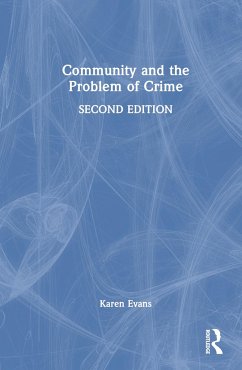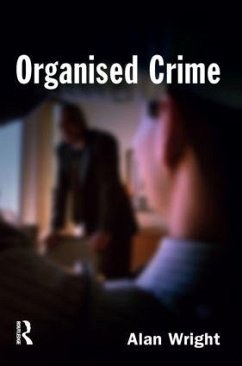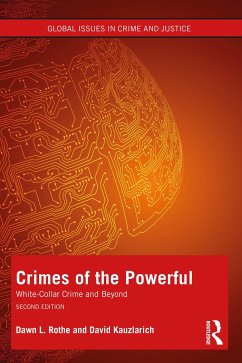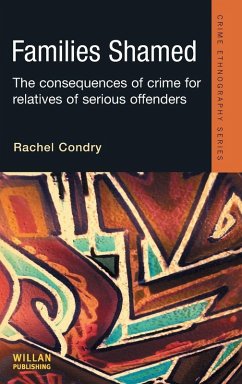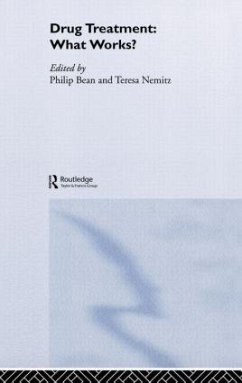The Rich Get Richer and the Poor Get Prison
Thinking Critically About Class and Criminal Justice
Versandkostenfrei!
Versandfertig in 1-2 Wochen
Weitere Ausgaben:

PAYBACK Punkte
75 °P sammeln!





For 40 years, this classic text has taken the issue of economic inequality seriously and asked: Why are our prisons filled with the poor? Why aren't the tools of the criminal justice system being used to protect Americans from predatory business practices and to punish well-off people who cause widespread harm?
Jeffrey Reiman is the William Fraser McDowell Professor Emeritus of Philosophy at American University in Washington, DC. Dr. Reiman is the author of In Defense of Political Philosophy (1972), Justice and Modern Moral Philosophy (1990), Critical Moral Liberalism: Theory and Practice (1997), The Death Penalty: For and Against (with Louis P. Pojman, 1998), Abortion and the Ways We Value Human Life (1999), As Free and as Just as Possible (2012), and more than 60 articles in philosophy and criminal justice journals and anthologies. Paul Leighton is a Professor in the Department of Sociology, Anthropology and Criminology at Eastern Michigan University. Dr. Leighton is the co-author of Punishment for Sale (with Donna Selman, 2010) and Class, Race, Gender and Crime (6th edition, 2023). He has been president of the board of his local domestic violence shelter and is currently head of the advisory board of his university's food pantry.
Produktdetails
- Verlag: Routledge
- 13. Auflage
- Seitenzahl: 304
- Erscheinungstermin: 28. April 2023
- Englisch
- Abmessung: 235mm x 157mm x 21mm
- Gewicht: 594g
- ISBN-13: 9781032440729
- ISBN-10: 1032440724
- Artikelnr.: 67258603
Herstellerkennzeichnung
Libri GmbH
Europaallee 1
36244 Bad Hersfeld
gpsr@libri.de
"This book is a classic text, and should be read by everyone interested in understanding crime and justice in America. I first read it decades ago, and it changed the way I think about these issues. The argument holds up over time, and draws attention not only to deficiencies in the way we explain crime and promote 'justice,' but also contains an important critique of the focus of criminology on the crimes of powerless to the exclusion of examinations of the crimes of powerful corporate and political criminals in society."
-Michael J. Lynch, Professor of Criminology, University of South Florida
"Close to 50 years now after its original publication, this book and its main arguments (sadly) remain more
-Michael J. Lynch, Professor of Criminology, University of South Florida
"Close to 50 years now after its original publication, this book and its main arguments (sadly) remain more
Mehr anzeigen
pertinent than ever. It is clearly written while not shying from complex and important concepts, like the social construction of crime and criminality, and the ideological role of our criminal justice system. Its clarity and organization make it infinitely teachable and readable, while its frequent updates provide current and cutting edge evidence to support its claims. I look forward to continuing to teach with this book in the years ahead."
-Sarah Tosh, Assistant Professor of Sociology, Anthropology, and Criminal Justice, Rutgers University
"I first was exposed to this book as a graduate student back in the 1980s. At the time, I was working full time in a prison and really thought the book was thought-provoking. When I became a college professor and was asked to teach a class on crime control policy, I immediately knew this was the book to use. This book, at least to me, is perfect for talking about policy, power, and control. Thus, this book is an important read for any criminal justice student!"
-Nancy L. Hogan, Professor of Criminal Justice, Ferris State University
"I use this book in undergraduate and graduate courses. It has been for many years, and I'm sure will continue to be, the best means for sharing with students a critical overview of criminal justice. Its coauthors are among the best at challenging dogma and providing accessible, thoughtful analyses of US criminal justice. Many of my students respond thoughtfully to the book. Since an academic colleague who is a lawyer and former police officer recommended it to me about a decade ago, I have been very enthusiastic about this book. It is part of my short list of books I wish I had written."
-Joshua R. Klein, Associate Professor of Sociology and Criminology, Iona College
"The Rich Get Richer and the Poor Get Prison remains an all-time classic which has become, if anything, more relevant as time has progressed. It is a truly comprehensive examination of the criminal legal system, clearly and concisely demonstrating how and why the system does not operate as it claims, as well as how it violates so many of our basic conceptions of fairness and justice. Required reading for anyone seeking to understand why our response to crime is fundamentally broken."
-Jesse Wozniak, Associate Professor of Sociology, West Virginia University
"An established part of the criminal justice/criminology literature which emphasizes social class and its relationship to criminal justice, The Rich Get Richer and the Poor Get Prison, 13th Edition, provides critical updates to the changing landscape of crime and justice in the United States. Reiman and Leighton eloquently address issues like discrimination and victimization while returning the centrality of class over time. This fosters critical thinking and provides fodder for excellent classroom discussions, even in large, lecture courses like mine."
-Mike-Frank G. Epitropoulos, Senior Lecturer in Sociology, University of Pittsburgh
"For nearly 50 years, The Rich Get Richer and the Poor Get Prison, has been documenting the scope, rate, and severity of biases in the American criminal justice system. In this 13th edition, Reiman and Leighton bring the same scholarship and analysis long-time readers continue to reference, with new data speaking to some of the most pressing justice issues of our times-climate change, corporate crime, and the ever-growing, staggering gap between America's rich and poor."
-Kimberly L. Barrett, Associate Professor of Criminology, Eastern Michigan University
-Sarah Tosh, Assistant Professor of Sociology, Anthropology, and Criminal Justice, Rutgers University
"I first was exposed to this book as a graduate student back in the 1980s. At the time, I was working full time in a prison and really thought the book was thought-provoking. When I became a college professor and was asked to teach a class on crime control policy, I immediately knew this was the book to use. This book, at least to me, is perfect for talking about policy, power, and control. Thus, this book is an important read for any criminal justice student!"
-Nancy L. Hogan, Professor of Criminal Justice, Ferris State University
"I use this book in undergraduate and graduate courses. It has been for many years, and I'm sure will continue to be, the best means for sharing with students a critical overview of criminal justice. Its coauthors are among the best at challenging dogma and providing accessible, thoughtful analyses of US criminal justice. Many of my students respond thoughtfully to the book. Since an academic colleague who is a lawyer and former police officer recommended it to me about a decade ago, I have been very enthusiastic about this book. It is part of my short list of books I wish I had written."
-Joshua R. Klein, Associate Professor of Sociology and Criminology, Iona College
"The Rich Get Richer and the Poor Get Prison remains an all-time classic which has become, if anything, more relevant as time has progressed. It is a truly comprehensive examination of the criminal legal system, clearly and concisely demonstrating how and why the system does not operate as it claims, as well as how it violates so many of our basic conceptions of fairness and justice. Required reading for anyone seeking to understand why our response to crime is fundamentally broken."
-Jesse Wozniak, Associate Professor of Sociology, West Virginia University
"An established part of the criminal justice/criminology literature which emphasizes social class and its relationship to criminal justice, The Rich Get Richer and the Poor Get Prison, 13th Edition, provides critical updates to the changing landscape of crime and justice in the United States. Reiman and Leighton eloquently address issues like discrimination and victimization while returning the centrality of class over time. This fosters critical thinking and provides fodder for excellent classroom discussions, even in large, lecture courses like mine."
-Mike-Frank G. Epitropoulos, Senior Lecturer in Sociology, University of Pittsburgh
"For nearly 50 years, The Rich Get Richer and the Poor Get Prison, has been documenting the scope, rate, and severity of biases in the American criminal justice system. In this 13th edition, Reiman and Leighton bring the same scholarship and analysis long-time readers continue to reference, with new data speaking to some of the most pressing justice issues of our times-climate change, corporate crime, and the ever-growing, staggering gap between America's rich and poor."
-Kimberly L. Barrett, Associate Professor of Criminology, Eastern Michigan University
Schließen
Für dieses Produkt wurde noch keine Bewertung abgegeben. Wir würden uns sehr freuen, wenn du die erste Bewertung schreibst!
Eine Bewertung schreiben
Eine Bewertung schreiben
Andere Kunden interessierten sich für





